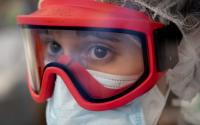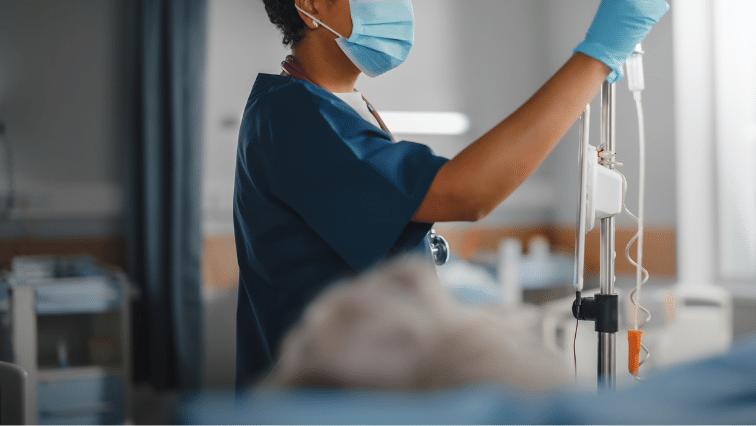[ad_1]
High percentages of infection preventionists (IPs) reported that COVID-19–related stressors worsened their mental and physical health, highlighting the need to address systemic issues that lead to burnout and improve recruitment and retention, according to survey results reported yesterday in the American Journal of Infection Control.
In the first-of-its-kind study, researchers from Ohio State University and the Association for Professionals in Infection Control and Epidemiology (APIC) emailed a survey to a random sample of 6,000 APIC members on issues surrounding mental and physical well-being, lifestyle behaviors, and perceived workplace wellness support during COVID-19.
Participants also answered questions on three questionnaires: the Patient Health Questionnaire-2, the Generalized Anxiety Disorder-2, and the Professional Quality of Life.
Most respondents (93.5%) were women, aged 35 to 64 years (77.1%), White (86.8%), married or in a relationship (82.5%), held a bachelor’s (41.2%) or master’s (42.3%) degree, worked 9- to 10-hour shifts (58.2%), worked in hospitals (68.1%), were not current smokers (92.1%), and were light drinkers (69.3%).
Amid the pandemic, IPs have had to adapt to rapidly evolving infection-prevention recommendations, shortages of personal protective equipment, increased hospital-acquired infections, and heavier workloads, the authors noted.
Only 17% report high quality of life
Of the 6,000 invitees, 926 (15%) completed the survey. About two-thirds indicated they were in good physical (68.9%) and mental health (66.0%). But respondents reported low rates of getting at least 7 hours of sleep a night (34.1%), being physically active for at least 150 minutes a week (18.8%), and eating five or more servings of fruits and vegetables a day (7.3%), along with high rates of depression (21.5%), anxiety (29.8%), and burnout (65%).
Only 16.9% of respondents said they had a high quality of life (QOL), while 74.0% said the pandemic had worsened their mental health, and 60% reported worse physical health. A total of 37.4% reported increased alcohol consumption during the pandemic, along with worse sleep (77%), less physical activity (64.5%), and less fruit and vegetable intake (61.1%).
Frontline and practicing IPs and administrators and directors were the most negatively affected by the pandemic in terms of physical health, while those in other roles were more likely to report meeting physical activity recommendations (odds ratio [OR], 2.68). Larger percentages of frontline and practicing IPs (74.1%) and administrators and directors (76.3%) also reported worse mental health than those in other roles (61.4%).
Those with higher perceived organizational wellness support were more likely to get at least 7 hours of sleep a night, meet recommended physical activity targets, and not smoke. Relative to IPs who said they had low or no organizational support, those whose employers supported wellness “very much or moderately” were 67% more likely to sleep 7 hours a night, 35% less likely to report worse sleep, and 43% less likely to report decreased physical activity.
IPs with some workplace support had higher odds of good mental health (OR, 1.81) and no depression (OR, 1.51), anxiety (OR, 1.86), or burnout (OR, 1.77) than those with no to little support. IPs whose employers supported wellness very much or moderately had significantly higher odds in all good-health indicators than those with no to little support, with odds ratios of 1.94 for physical health to 9.00 for high professional QOL.
IPs who worked 9 to 11 or more hours per day were more prone to not getting enough sleep and to report declining physical and mental health than those working 8 hours or less. Larger percentages of non-White IPs were less likely to report declining physical health (OR, 0.59) and were more likely to say they were in good mental health (OR, 1.58), with no depression or anxiety, low stress levels, and high professional QOL.
IP recruitment, retention key to quality care
With a 25% vacancy rate for IPs and an expected 40% expected to retire in the next decade, recruitment and retention of highly skilled IPs is a priority in maintaining the quality and safety of healthcare, the researchers said.
“Considering that poor clinician well-being increases turnover, APIC must continue to endorse the importance of investing in worksite wellness cultures that promote well-being through ’empowerment, risk-taking, engagement, resilience, transparency, and respect,’ ” they wrote.
The authors said that healthcare organizations need to take action now to better protect IPs’ health and safety, including addressing systemic issues such as short staffing and long shifts that lead to burnout and poor health, and instituting or enhancing mental health programs and screening.
“Infection preventionists have been instrumental in enabling healthcare facilities to deliver safe care during the COVID-19 pandemic,” APIC President Linda Dickey, RN, MPH, who was not a study author, said in an APIC news release. “The fact that so many are exhibiting symptoms of burnout is concerning and should prompt employers to adopt programs to promote well-being in order to retain these highly skilled professionals.”
[ad_2]
Source link



